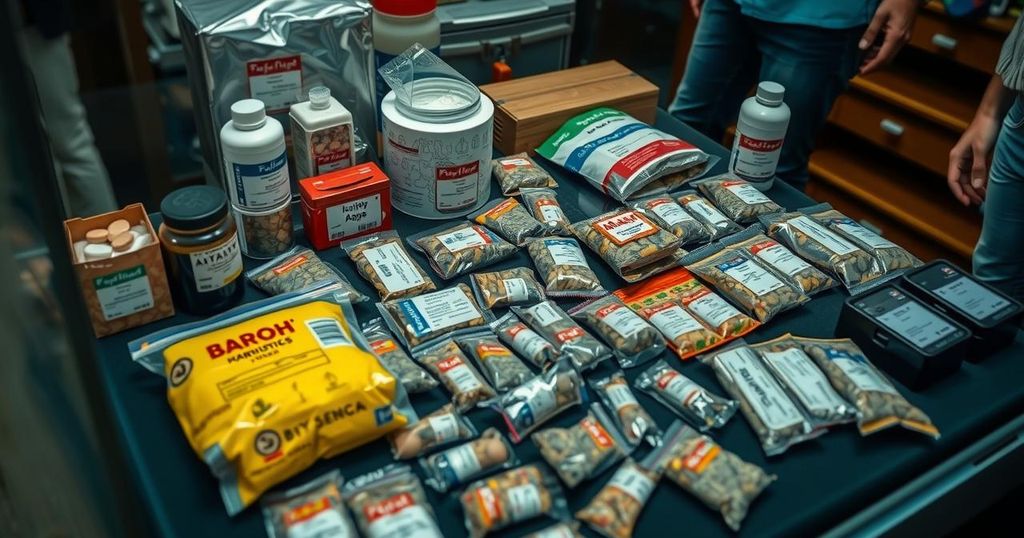Syrian authorities intercepted 600,000 Captagon pills intended for smuggling into Iraq, highlighting the narcotics trade heavily influenced by Iran-linked groups. The operation points to rising regional tensions, particularly with Israeli military actions aimed at countering Iranian influence in Syria. Recent changes in policies regarding Iraqi nationals entering Syria and agreements to combat narcotics trafficking illustrate the complex and multifaceted nature of this issue.
On Thursday, Syrian authorities successfully intercepted a substantial shipment of 600,000 Captagon pills intended for smuggling into Iraq, marking a rare operation against narcotics trafficking, which is largely controlled by Iran-aligned groups. The operation occurred as a security unit in Damascus raided a farm located on the city’s outskirts, leading to the confiscation of the amphetamine-like stimulant from a vehicle. During this incident, one individual was apprehended, although his identity was not disclosed, who is reportedly affiliated with a network specializing in drug transport and smuggling operations to Iraq. Meanwhile, there is an ongoing search for his accomplices. Iraq serves as a significant transit route for Captagon, which is predominantly manufactured in Syria, with pathways leading toward Saudi Arabia and European markets. In addition, Iraq plays a crucial role in sourcing raw materials from Afghanistan for various drugs produced in Syria, where Cartels, often operating in Iranian-backed zones, have made narcotics trafficking a lucrative business. The state of affairs in Syria has deteriorated as pro-Iran groups, manipulated by the Iranian Revolutionary Guard Corps (IRGC), maintain a corridor for drug trafficking stretching from Iraq to Lebanon’s border. The situation escalated after these illicit activities drew increased scrutiny from Israel, particularly as it aimed to undermine the Iranian influence within Syria. Earlier the same day, Israeli airstrikes targeted areas in Qusayr, reportedly impacting roads and workshops linked to Hezbollah, as tensions in the region heightened. Additionally, the Syrian military has enacted new regulations that restrict Iraqi nationals from entering Syria, requiring them to secure online permissions and pay associated fees. In a broader context, Arab nations have recently begun normalizing relations with Damascus, though the requirement to tackle the Captagon trade has not yet resulted in a significant decline in exports. Conversely, cooperation between Iraq and Syria intensified with a recently signed security pact aimed at curbing the narcotics flow across their shared border, which continues to be dominated by pro-Iran factions. Despite the ongoing military support from Russia, Syria’s capacity to control the burgeoning drug trade remains questionable as the Israeli military takes aggressive actions such as bombing facilities tied to Assad’s regime and its allies. The geopolitical dynamics surrounding the Syrian conflict not only illustrate the implications of narcotics in funding networks but also highlight the entwined relationship between various state and non-state actors operating within the region.
This article addresses the growing concerns surrounding the narcotics trade in Syria, specifically focusing on the illegal production and smuggling of Captagon, an amphetamine-like stimulant. Given Syria’s historical ties with Iran, the article highlights how Iranian-backed groups have influenced drug trafficking networks that operate from Syria into neighboring nations, particularly Iraq. The recent seizure of Captagon pills by Syrian authorities illustrates the complexities of controlling this thriving narcotics industry amid ongoing geopolitical tensions, particularly with Israel’s military actions against Iranian interests in the region. Previous Arab attempts to reestablish relations with Syria were contingent upon Damascus showing progress in curtailing narcotics trafficking. The evolving scenario raises questions about the effectiveness of Syria’s capabilities to manage these illicit activities in light of external pressure and internal corruption.
In summary, the recent seizure of a significant cache of Captagon pills underscores both the challenges and complexities of the narcotics trade in Syria, exacerbated by the influence of Iranian-backed groups. The situation remains tenuous, as ongoing military actions by Israel add further pressure on the Syrian regime while attempts at reestablishing relations with Arab nations hinge upon narcotics control. The balance of power among various factions, both domestic and foreign, continues to shape the future of narcotics trafficking and its implications for regional stability.
Original Source: www.thenationalnews.com






